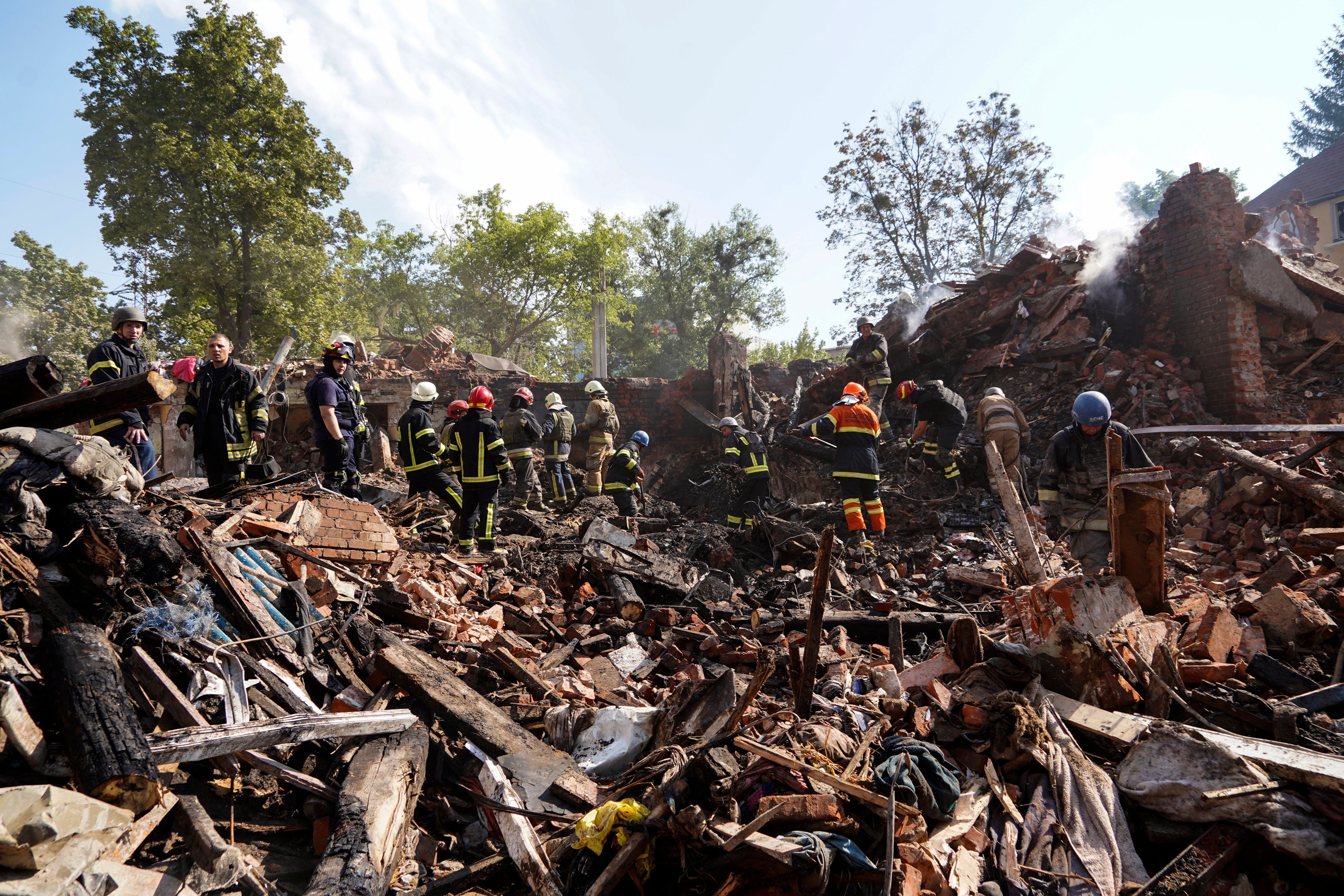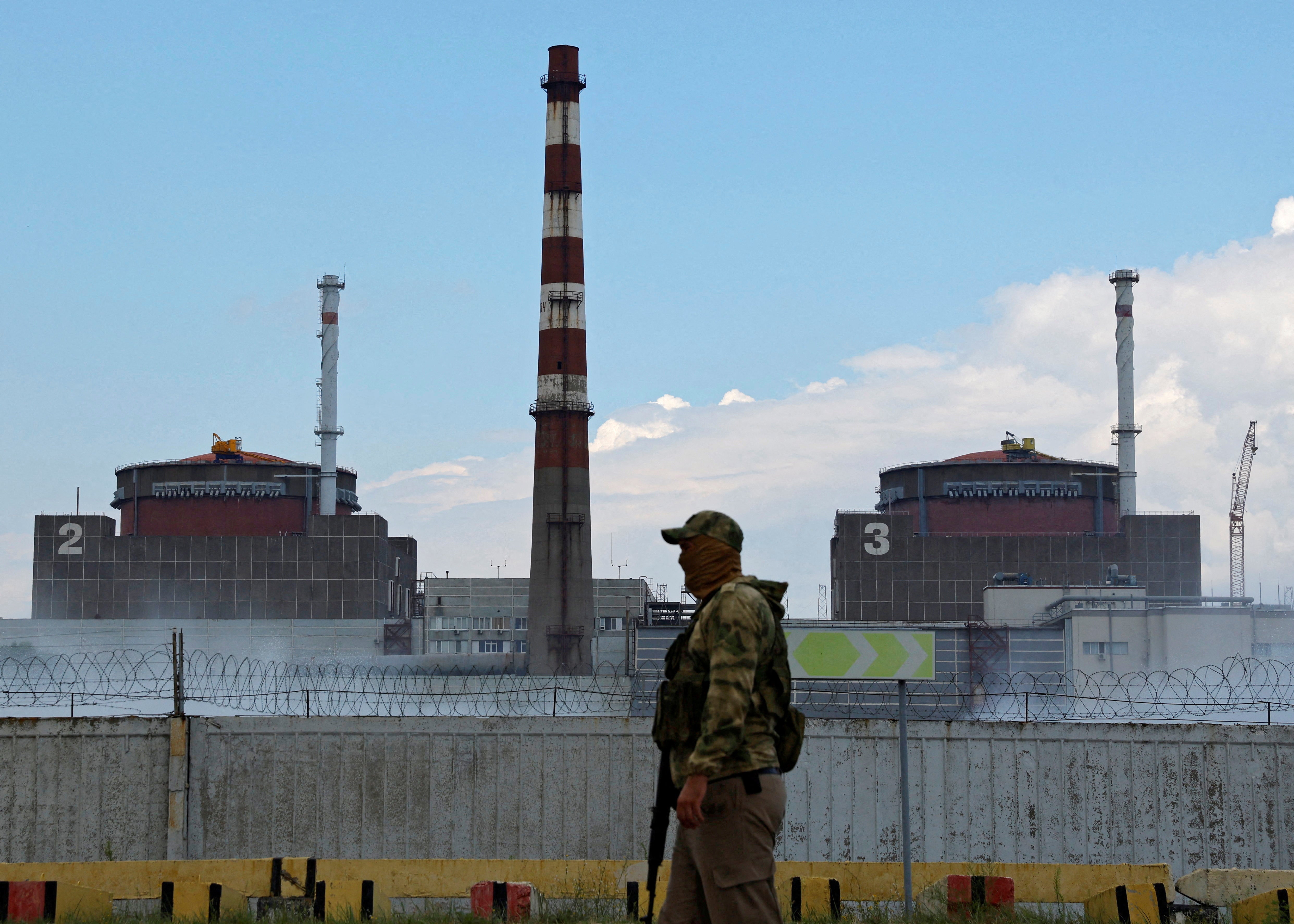
Ukraine’s second city of Kharkiv has suffered “one of the most tragic” nights of Vladimir Putin’s war so far, regional authorities have said.
The northeastern city and surrounding area have been struck by multiple Russian attacks in the past 24 hours – leaving a double-figure death toll and scores of injuries.
Seven people were said to have been killed and 17 wounded in an attack in the city’s Saltivka district on Wednesday, which Ukraine’s president Volodymyr Zelensky branded a “devious and cynical strike on civilians with no justification”.
One resident who said their dormitory was hit with a missile on Wedesnday, Tamara Kramarenko, told Reuters: “We’ve got three windows – nothing else left. The stairs started collapsing, people started helping each other.”
This was follwed by a pre-dawn Russian strike on the city, which hit an apartment building. The shelling killed two people and wounded 18, including two children, regional governor Oleh Synehubov said.
“Last night was one of the most tragic of the entire war in the Kharkiv region,” he lamented, also alleging that a further two people were killed on Thursday in a rocket attack on the town of Krasnohrad.
While Moscow largely abandoned its attempts to seize Kharkiv in May, withdrawing its troops and refocusing them in the eastern Donbas region, the city is still subject to less concentrated Russian attacks from the sky.

The fresh devastation came as Mr Zelensky hosts United Nations chief Antonio Guterres and Turkish president Recep Tayyip Erdogan in the western city of Lviv on Thursday afternoon.
While diplomatic efforts to help bring the war to an end were likely to be discussed, the passage of grain to the world’s hungry was also on the agenda – with both parties helping to broker last month’s agreement aimed at allowing some exports from Russian-blockaded Black Sea ports.
The three leaders were also set to discuss the volatile situation at the Russian-held Zaporizhzhia nuclear power plant, Europe’s largest, which Moscow and Kyiv have accused each other of shelling.
The meeting comes a day after Nato called on Russia to allow UN inspectors into the power plant, warning of the risk “of a nuclear accident or incident”.
But on Thursday, Russia said it may shut the nuclear plant down if shelling continues there, and denied accusations it had deployed heavy weapons in and around the facility.
Announcing that Moscow was taking measures to ensure the plant’s safety, Russia’s defence ministry claimed Kyiv was planning a “provocation” there on Friday during Mr Guterres’ visit.
Furthermore, the head of Russia’s radioactive, chemical and biological defence forces, Igor Kirillov, claimed the plant’s back-up support systems have already been damaged as a result of shelling.

At a briefing on Thursday, he presented a slide showing that, in the event of an accident at the plant, radioactive material would cover Germany, Poland and Slovakia.
Meanwhile, in his nightly video address, Mr Zelensky appeared to reference the recent wave of explosions at Russian facilities in annexed Crimea, as he alluded to attacks behind enemy lines and said: “The invaders will die like dew in the sun.”
Nine Russian warplanes were reportedly destroyed at an air base in Crimea last week, while an ammunition depot on the peninsula blew up on Tuesday. Ukrainian officials have stopped short of publicly taking responsibility for the attacks.
The recent blasts – which Moscow has blamed on “sabotage” – appear to be turning the formerly secure territory into a fresh battleground, and threaten to further stretch Mr Putin’s forces as the Kremlin’s war grinds on.
In a move some 750 miles to the north of Crimea, Russian state media reported that Moscow had relocated three MiG-31E warplanes equipped with Kinzhal hypersonic missiles to Kaliningrad, where they would be on round-the-clock duty.
The Russian Baltic coast exclave became a flashpoint in the war several months ago, with Moscow pledging to retaliate after neighbouring Lithuania – a Nato member – sought to limit the movement of goods to the region, in line with EU sanctions.
Interfax’s report of the relocation of the warplanes – whose missiles can fly at 10 times the speed of sound and carry either nuclear or conventional warheads – came shortly after Finland said two such jets were suspected of violating its airspace near the city of Porvoo.
With many analysts having expressed surprise at the standard of Russia’s military performance and equipment on the ground during what has become a grinding war of attrition, the UK’s Ministry of Defence sought on Thursday to explain the heavy toll on Moscow’s battle tanks.
Pointing to “widespread” and “well-documented” incidents of turret ejection, the ministry said the tanks’ apparent vulnerability “is highly likely partially due to Russia’s failure to fit and properly employ” vehicle armour.
Poor use of Explosive Reactive Armour among Russian troops dates back to the First Chechen War in 1994, the ministry said in its “intelligence update”, adding that it was likely many tank crews lack the training to properly deploy the armour.
“The war has seen numerous failures by Russian commanders to enforce low-level battle discipline – such as the use of [Explosive Reactive Armour],” the ministry said.
“The cumulative effect of these failures is likely a significant factor behind the poor performance of Russia’s forces.”
In areas which Russia has managed to capture, such as Kherson, the occupiers are said to be attempting to force school leaders to teach children pro-Kremlin material.
In an interview with The Times, Ukraine’s education minister Serhiy Shkarlet alleged that Mr Putin’s soldiers were arresting and even torturing teachers who resist the changes, and burning Ukrainian books.
Additional reporting by agencies







